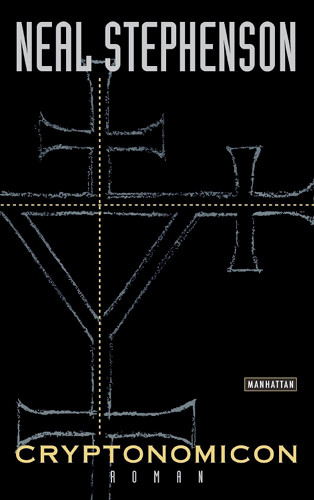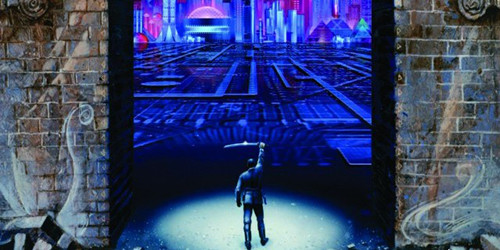Excerpt from the novel Cryptonomicon 
 by Neal Stephenson
by Neal Stephenson 


Bobby Shaftoe knows nothing of his future. All he knows is that he has been promoted to sergeant, detached from his former unit (no great adjustment, since he is the only surviving member of his platoon) and reassigned to some unheard-of branch of the Corps in Washington, D.C.
D.C.’s a busy place, but last time Bobby Shaftoe checked the newspapers, there wasn’t any combat going on there, and so it’s obvious he’s not going to get a combat job. He’s done his bit anyway, killed many more than his share of Nips, won his medals, suffered from his wounds. As he lacks administrative training, he expects that his new assignment will be to travel around the country being a war hero, raising morale and suckering young men into jointing the Corps.
He reports, as ordered, to Marine Barracks, Washington, D.C. It’s the Corps’s oldest post, a city block halfway between the Capitol and the Navy Yard, a green quadrangle where the Marine Band struts and the drill team drills. He half expects to see strategic reserves of spit and of polish stored in giant tanks nearby.
Two Marines are in the office: a major, who is his new, nominal commanding officer, and a colonel, who looks and acts like he was born here. It is shocking beyond description that two such personages would be there to greet a mere sergeant. Must be the Navy Cross that got their attention. But these Marines have Navy Crosses of their own—two or three apiece.
The major introduces the colonel in a way that doesn’t really explain a damn thing to Shaftoe. The colonel says next to nothing; he’s there to observe. The major spends a while fingering some typewritten documents.
“Says right here you are gung-ho.”
“Sir, yes, sir!”
“What the hell does that mean?”
“Sir, it is a Chinese word! There’s a Communist there, name of Mao, and he’s got an army. We tangled with ’em on more’n one occasion, sir. Gung-ho is their battle cry, it means ‘all together’ or something like that, so after we got done kicking the crap out of them, sir, we stole it from them, sir!”
“Are you saying you have gone Asiatic like those other China Marines, Shaftoe?”
“Sir! On the contrary, sir, as I think my record demonstrates, sir!”
“You really think that?” the major says incredulously. “We have an interesting report here on a film interview that you did with some soldier named Lieutenant Reagan.”
“Sir! This Marine apologizes for his disgraceful behavior during that interview, sir! This Marine let down himself and his fellow Marines, sir!”
“Aren’t you going to give me an excuse? You were wounded. Shellshocked. Drugged. Suffering from malaria.”
“Sir! There is no excuse, sir!”
The major and the colonel nod approvingly at each other.
This “sir, yes sir” business, which would probably sound like horseshit to any civilian in his right mind, makes sense to Shaftoe and to the officers in a deep and important way. Like a lot of others, Shaftoe had trouble with military etiquette at first. He soaked up quite a bit of it growing up in a military family, but living the life was a different matter. Having now experienced all the phases of military existence except for the terminal ones (violent death, court-martial, retirement), he has come to understand the culture for what it is: a system of etiquette within which it becomes possible for groups of men to live together for years, travel to the ends of the earth, and do all kinds of incredibly weird shit without killing each other or completely losing their minds in the process. The extreme formality with which he addresses these officers carries an important subtext: your problem, sir, is deciding what you want me to do, and my problem, sir, is doing it. My gung-ho posture says that once you give the order I’m not going to bother you with any of the details—and your half of the bargain is you had better stay on your side of the line, sir, and not bother me with any of the chickenshit politics that you have to deal with for a living. The implied responsibility placed upon the officer’s shoulders by the subordinate’s unhesitating willingness to follow orders is a withering burden to any officer with half a brain, and Shaftoe has more than once seen seasoned noncoms reduce green lieutenants to quivering blobs simply by standing before them and agreeing, cheerfully, to carry out their orders.
“This Lieutenant Reagan complained that you kept trying to tell him a story about a lizard,” the major says.
“Sir! Yes, sir! A giant lizard, sir! An interesting story, sir!” Shaftoe says.
“I don’t care,” the major says. “The question is, was it an appropriate story to tell in that circumstance?”
“Sir! We were making our way around the coast of the island, trying to get between these Nips and a Tokyo Express landing site, sir! . . .” Shaftoe begins.
“Shut up!”
“Sir! Yes, sir!”
There is a sweaty silence that is finally broken by the colonel. “We had the shrinks go over your statement, Sergeant Shaftoe.”
“Sir! Yes, sir!”
“They are of the opinion that the whole giant lizard thing is a classic case of projection.”
“Sir! Could you please tell me what the hell that is, sir!”
The colonel flushes, turns his back, peers through blinds at sparse traffic out on Eye Street. “Well, what they are saying is that there really was no giant lizard. That you killed that Jap in hand-to-hand combat. And that your memory of the giant lizard is basically your id coming out.”
“Id, sir!”
“That there is this id thing inside your brain and that it took over and got you fired up to kill that Jap bare-handed. Then your imagination dreamed up all this crap about the giant lizard afterwards, as a way of explaining it.”
“Sir! So you are saying that the lizard was just a metaphor, sir!”
“Yes.”
“Sir! Then I would respectfully like to know how that Nip got chewed in half, sir!”
The colonel screws up his face dismissively. “Well, by the time you were rescued by that castwatcher, Sergeant, you had been in that cove for three days along with all of those dead bodies. And in that tropical heat with all those bugs and scavengers, there was no way to tell from looking at that Jap whether he had been chewed up by a giant lizard or run through a brush chipper, if you know what I mean.”
“Sir! Yes I do, sir!”
The major goes back to the report. “This Reagan fellow says that you also repeatedly made disparaging comments about General MacArthur.”
“Sir, yes, sir! He is a son of a bitch who hates the Corps, sir! He is trying to get us all killed, sir!”
The major and the colonel look at each other. It is clear that they have, wordlessly, just arrived at some decision.
“Since you insist on reenlisting, the typical thing would be to have you go around the country showing off your medals and recruiting young men into the Corps. But this lizard story kind of rules that out.”
“Sir! I do not understand, sir!”
“The Recruitment Office has reviewed your file. They have seen Reagan’s report. They are nervous that you are going to be in West Bumfuck, Arkansas, riding in the Memorial Day parade in your shiny dress uniform, and suddenly you are going to start spouting all kinds of nonsense about lizards and scare everyone shitless and put a kink in the war effort.”
“Sir! I respectfully—”
“Permission to speak denied,” the major says. “I won’t even get into your obsession with General MacArthur.”
“Sir! The general is a murdering—”
“Shut up!”
“Sir! Yes, sir!”
“We have another job for you, Marine.”
“Sir! Yes, sir!”
“You’re going to be part of something very special.”
“Sir! The Marine Raiders are already a very special part of a very special Corps, sir!”
“That’s not what I mean. I mean that this assignment is . . . unusual.” The major looks over at the colonel. He is not sure how to proceed.
The colonel puts his hand in his pocket, jingles coins, then reaches up and checks his shave.
“It is not excatly a Marine Corps assignment,” he finally says. “You will be part of a special international detachment. An American Marine Raider platoon and a British Special Air Services squadron, operating together under one command. A bunch of tough hombres who’ve shown they can handle any assignment, under any conditions. Is that a fair description of you, Marine?”
“Sir! Yes, sir!”
“It is a very unusual setup,” the colonel muses, “not the kind of thing that military men would ever dream up. Do you know what I’m saying, Shaftoe?”
“Sir, no, sir! But I do detect a strong odor of politics in the room now, sir!”
The colonel gets a little twinkle in his eye, and glances out the window towards the Capitol dome. “These politicians can be real picky about how they get things done. Everything has to be just so. They don’t like excuses. Do you follow me, Shaftoe?”
“Sir! Yes, sir!”
“The Corps had to fight to get this. They were going to make it an Army thing. We pulled a few strings with some former Naval persons in high places. Now the assignment is ours. Some would say, it is ours to screw up.”
“Sir! The assignment will not be screwed up, sir!”
“The reason that son of a bitch MacArthur is killing Marines like flies down in the South Pacific is because sometimes we don’t play the political game that well. If you and your new unit do not perform brilliantly, that situation will only worsen.”
“Sir! You can rely on this Marine, sir!”
“Your commanding officer will be Lieutenant Ethridge. An Annapolis man. Not much combat experience, but knows how to move in the right circles. He can run interference for you at the political level. The responsibility for getting things done on the ground will be entirely yours, Sergeant Shaftoe.”
“Sir! Yes, sir!”
“You’ll be working closely with British Special Air Service. Very good men. But I want you and your men to outshine them.”
“Sir! You can count on it, sir!”
“Well, get ready to ship out, then,” the major says. “You’re on your way to North Africa, Sergeant Shaftoe.”
Like this:
Like Loading...
![]()
![]() by Neal Stephenson
by Neal Stephenson ![]()
![]()



